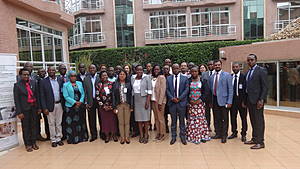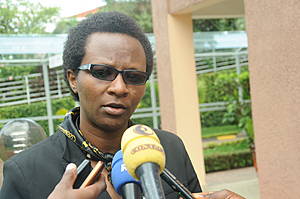The Second ARSO Conformity Assessment Committee Meeting Winds up in Kigali

ARSO CACO meeting group photo
From 20th February, 2017, the second meeting of the African Organization for Standardization (ARSO) Conformity Assessment Committee (ARSO CACO) was being held in Kigali, Rwanda.
In order to strengthen conformity assessment to facilitate intra-African trade, In June 2013, the 48th ARSO Council revisited the mandate of ARSO Certification Committee (ARSO-CERTCO) and rebranded it as ARSO Conformity Assessment Committee (ARSO CACO), while refining the overall mandate as being the promotion and coordination of conformity assessment activities on the African continent without engaging in the actual certification process. The purpose of ARSO Conformity Assessment system is to increase the use of ARSO standards thus facilitating trade amongst African countries and with the outside world.
It is against this background that in September 2016 ARSO CACO convened its launch meeting as its re-activation to provide a platform that will set criteria and develop guidelines which will promote application of African standards.
The launching meeting resolved to hold a follow up meeting in February 2017 in Kigali, Rwanda to review the progress of assignments given to the working groups and the identified needs for training and propose the way forward.
The objective of the ARSO CACO meeting in Kigali was to review the implementation of the recommendation of the launching meeting and draw a roadmap for CACO work.
The meeting saw the participation of the CACO members from different countries in Africa, namely: Botswana, Ivory Coast, Democratic Republic of Congo, Ghana, Guinea, Kenya, Madagascar, Mauritius, Namibia, Nigeria, Rwanda, Senegal, Seychelles, Sierra Leone, South Africa, Sudan, Tanzania, Togo, Tunisia, Uganda and Zambia.
Participants at the meeting discussed and made recommendations on different conformity assessment issues on the agenda including: the role of Conformity Assessment in service industry of cosmetology, ISO reference standards on Conformity Assessment, African Conformity Assessment Plan (ACAP) and benchmarking, Africa Traditional Medicine and key standards’ performance indicators, amongst the others. The second day was marked by break out in four CACO working group to discuss key matters while the third day summarized presentations and discussion of reports from working groups, general discussions and drawing a way forward.

Dr. Hermogene Nsengimana, ARSO Secretary General
Addressing the media at the closing of the meeting, Dr. Hermogene Nsengimana ARSO Secretary General informed: “Expected outcome of this meeting was increased adoption and implementation of African standards thus facilitating intra-African trade and global trade. We also seek and implement collaborative arrangements in conformity assessment activities among participating members of ARSO-CACO. This meeting was a success as the ARSO CACO drafted base tools and proposed a way forward. Important recommendations were made and the report will be tabled before the ARSO Council in July for adoption”.

ARSO CACO Chairperson addressing the media
Speaking about the expected impact of the CACO activity, Ms Caroline A. Outa Ogweno, the CACO Chairperson, emphasized: “Boosting intra-African trade by laying ground for establishment of mutual recognition of conformity assessment or recognition of equivalence among African countries is our goal. The Committee has discussed and came up with conformity assessment documents and important recommendations that will be presented to the ARSO Council for validation and implementation”.

Ms Antoinette Mbabazi, National Certification Division Manager
Ms Antoinette Mbabazi, National Certification Division Manager, speaking on behalf of RSB Director General, enthused that Conformity Assessment is key to ensuring product quality as if not well managed can result into forms of Technical Barriers to Trade. It is important that African countries discuss and set common tools that would harmonize and guide practices to enable free movement of safe products.